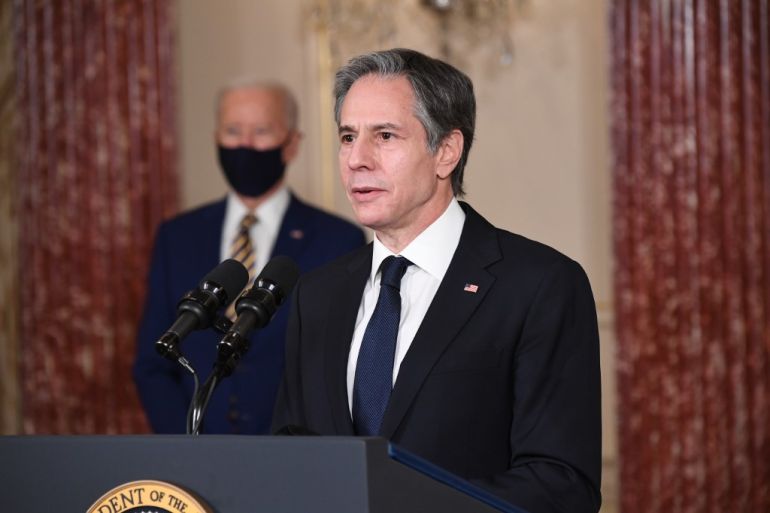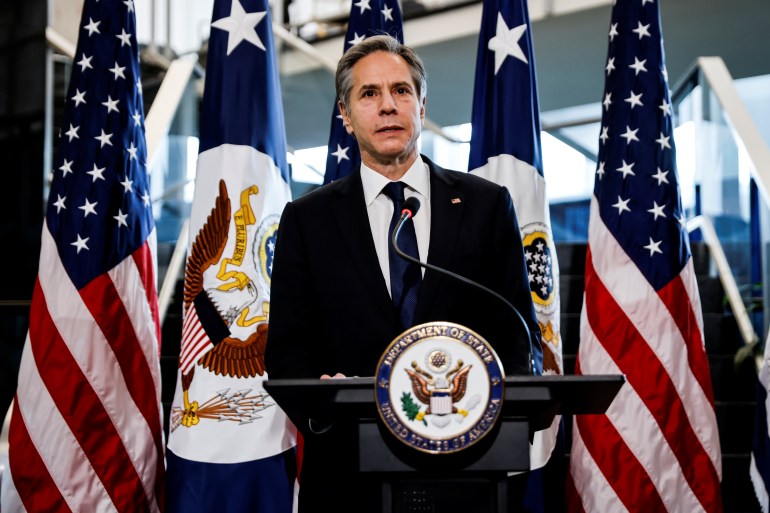Blinken presses China on Myanmar, Uighurs, HK in first call
Top US diplomat talks tough on Myanmar, Xinjiang and Hong Kong, as Beijing notes more room for cooperation than with the Trump administration.

US Secretary of State Antony Blinken pressed Beijing on its treatment of Uighurs, Tibetans, Hong Kong and the coup in Myanmar in the first conversation between top officials of the two powers since President Joe Biden took office.
“I made clear the US will defend our national interests, stand up for our democratic values, and hold Beijing accountable for its abuses of the international system,” Blinken said on Twitter of his call with senior Chinese official Yang Jiechi.
Keep reading
list of 3 itemsUS warship sails near Chinese-controlled Paracel Islands
US Senate confirms Blinken as Biden’s secretary of state
Blinken told Yang that the United States “will continue to stand up for human rights and democratic values, including in Xinjiang, Tibet and Hong Kong,” a State Department statement said of the call, which took place on Friday.
Blinken also “pressed China to join the international community in condemning the military coup in Burma”, it said, using Myanmar’s former name.
Following the coup in Myanmar, China appeared muted in its response, saying it had “noted” the military takeover, and hoped that all sides could properly manage their differences under the Constitution and uphold stability.
In my call with my counterpart in Beijing, Yang Jiechi, I made clear the U.S. will defend our national interests, stand up for our democratic values, and hold Beijing accountable for its abuses of the international system.
— Secretary Antony Blinken (@SecBlinken) February 6, 2021
In January, China’s top diplomat, Wang Yi, met military chief Min Aung Hlaing, who has now assumed power, during a visit to Myanmar.
During the phone call, Blinken also said the US would hold Beijing “accountable for its efforts to threaten stability in the Indo-Pacific, including across the Taiwan Strait, and its undermining of the rules-based international system”.
Tensions have been building up between India and China in recent months, due to its border dispute in the Himalayan region, and the US has been trying to build a coalition with India, Japan and Australia, to take on Beijing.
Room for cooperation
At the same time, the US also ramped up its naval activities and patrols in the South China Sea, claiming freedom of navigation in the resource-rich area, most of which is being claimed by China.
China has been trying expanding its presence in the disputed sea lane, building artificial islands that can accommodate its naval and aerial activities.

Blinken’s tough tone came after his confirmation hearing, during which he promised to continue former President Donald Trump’s tough approach to China in a rare point of agreement between the two administrations.
Blinken has said he agrees with a determination by the State Department under Trump that Beijing is carrying out genocide in the western region of Xinjiang, where rights groups say more than one million Uighurs and other mostly Muslim Turkic-speaking people have been rounded up in camps.
Beijing has also accelerated a crackdown in Hong Kong, arresting leading activists after imposing a new law against subversion following large protests in the financial hub to which it had guaranteed a separate system.
In response, Washington has slapped sanctions against Chinese and Hong Kong officials, who are accused of repression against activists and opposition groups.
Despite the tensions, the Chinese state-owned newspaper, Global Times, however, took note on Friday of Biden’s “tough” but also “cautious” approach towards Beijing, which it said could signal more cooperation compared with the previous Trump administration.
“Biden’s attitude toward China inherits some parts from his predecessor, yet he has also adjusted the approach and made room for interacting with China. For China, the most solid our own strength is, the more positive influence we will have on how the US reviews its China policy.”